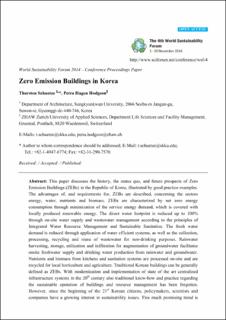Please use this identifier to cite or link to this item:
https://doi.org/10.21256/zhaw-2673Full metadata record
| DC Field | Value | Language |
|---|---|---|
| dc.contributor.author | Schütze, Thorsten | - |
| dc.contributor.author | Hagen Hodgson, Petra | - |
| dc.date.accessioned | 2018-03-14T09:30:48Z | - |
| dc.date.available | 2018-03-14T09:30:48Z | - |
| dc.date.issued | 2014 | - |
| dc.identifier.uri | https://digitalcollection.zhaw.ch/handle/11475/3701 | - |
| dc.description | Online-Konferenz | de_CH |
| dc.description.abstract | This paper discusses the history, the status quo, and future prospects of Zero Emission Buildings (ZEBs) in the Republic of Korea, illustrated by good practice examples. The advantages of, and requirements for, ZEBs are described, concerning the sectors energy, water, nutrients and biomass. ZEBs are characterized by net zero energy consumption through minimization of the service energy demand, which is covered with locally produced renewable energy. The direct water footprint is reduced up to 100% through on-site water supply and wastewater management according to the principles of Integrated Water Resource Management and Sustainable Sanitation. The fresh water demand is reduced through application of water efficient systems, as well as the collection, processing, recycling and reuse of wastewater for non-drinking purposes. Rainwater harvesting, storage, utilization and infiltration for augmentation of groundwater facilitates onsite freshwater supply and drinking water production from rainwater and groundwater. Nutrients and biomass from kitchens and sanitation systems are processed on-site and are recycled for local horticulture and agriculture. Traditional Korean buildings can be generally defined as ZEBs. With modernization and implementation of state of the art centralized infrastructure systems in the 20th century also traditional know-how and practice regarding the sustainable operation of buildings and resource management has been forgotten. However, since the beginning of the 21st Korean citizens, policymakers, scientists and companies have a growing interest in sustainability issues. This much promising trend is also reflected by a growing number of research and development activities, including the construction and operation of ZEBs. | de_CH |
| dc.language.iso | en | de_CH |
| dc.publisher | MDPI | de_CH |
| dc.relation.ispartofseries | Sciforum Electronic Conference Series | de_CH |
| dc.rights | Licence according to publishing contract | de_CH |
| dc.subject | Zero emission building | de_CH |
| dc.subject | Energy efficiency | de_CH |
| dc.subject | Energy productivity | de_CH |
| dc.subject | Sustainable sanitation | de_CH |
| dc.subject | Urban agriculture | de_CH |
| dc.subject.ddc | 690: Hausbau und Bauhandwerk | de_CH |
| dc.title | Zero Emission Buildings in Korea | de_CH |
| dc.type | Konferenz: Paper | de_CH |
| dcterms.type | Text | de_CH |
| zhaw.departement | Life Sciences und Facility Management | de_CH |
| zhaw.organisationalunit | Institut für Umwelt und Natürliche Ressourcen (IUNR) | de_CH |
| dc.identifier.doi | 10.21256/zhaw-2673 | - |
| dc.identifier.doi | 10.3390/wsf-4-f001 | de_CH |
| zhaw.conference.details | The 4th World Sustainability Forum, Electronic Conference at sciforum.net/conference/wsf-4, 1-30 November 2014 | de_CH |
| zhaw.funding.eu | No | de_CH |
| zhaw.originated.zhaw | Yes | de_CH |
| zhaw.publication.status | publishedVersion | de_CH |
| zhaw.volume | 4 | de_CH |
| zhaw.publication.review | Not specified | de_CH |
| zhaw.title.proceedings | World Sustainability Forum 2014 – Conference Proceedings | de_CH |
| zhaw.webfeed | Grün und Gesundheit | de_CH |
| zhaw.funding.zhaw | 852 | de_CH |
| Appears in collections: | Publikationen Life Sciences und Facility Management | |
Files in This Item:
| File | Description | Size | Format | |
|---|---|---|---|---|
| 2014_Schuetze_Hodgson_Zero_Emission_Buildings_Korea.pdf | 1.59 MB | Adobe PDF |  View/Open |
Show simple item record
Schütze, T., & Hagen Hodgson, P. (2014). Zero Emission Buildings in Korea [Conference paper]. World Sustainability Forum 2014 – Conference Proceedings, 4. https://doi.org/10.21256/zhaw-2673
Schütze, T. and Hagen Hodgson, P. (2014) ‘Zero Emission Buildings in Korea’, in World Sustainability Forum 2014 – Conference Proceedings. MDPI. Available at: https://doi.org/10.21256/zhaw-2673.
T. Schütze and P. Hagen Hodgson, “Zero Emission Buildings in Korea,” in World Sustainability Forum 2014 – Conference Proceedings, 2014, vol. 4. doi: 10.21256/zhaw-2673.
SCHÜTZE, Thorsten und Petra HAGEN HODGSON, 2014. Zero Emission Buildings in Korea. In: World Sustainability Forum 2014 – Conference Proceedings. Conference paper. MDPI. 2014
Schütze, Thorsten, and Petra Hagen Hodgson. 2014. “Zero Emission Buildings in Korea.” Conference paper. In World Sustainability Forum 2014 – Conference Proceedings. Vol. 4. MDPI. https://doi.org/10.21256/zhaw-2673.
Schütze, Thorsten, and Petra Hagen Hodgson. “Zero Emission Buildings in Korea.” World Sustainability Forum 2014 – Conference Proceedings, vol. 4, MDPI, 2014, https://doi.org/10.21256/zhaw-2673.
Items in DSpace are protected by copyright, with all rights reserved, unless otherwise indicated.